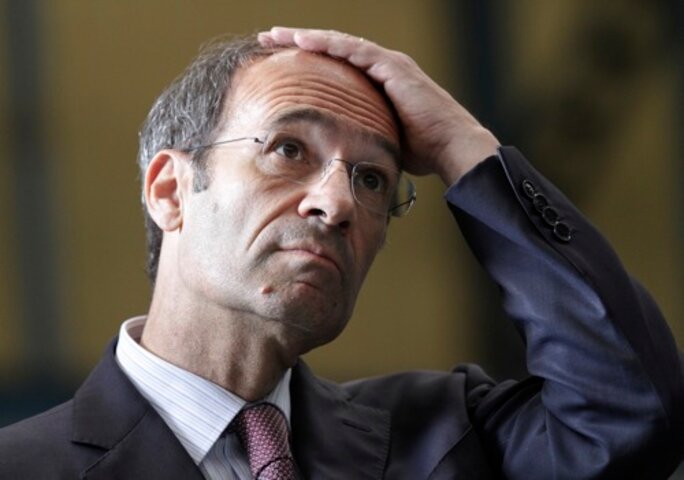A decision on whether to launch an investigation into suspected "abuse of authority" and "obstruction of the law" by former French finance minister and new IMF chief Christine Lagarde was postponed by a top French court on Friday. The suspicions over Lagarde's role in a generous payout of public money to French tycoon Bernard Tapie in 2008 were originally referred for investigation by France's senior public prosecutor in May. Michel Deléan reports on the latest events in a case that threatens to undermine Lagarde's IMF mandate and the reputation of the institution.
-------------------------
In a surprise announcement on Friday, a French court postponed until August 4th a decision on whether to refer for investigation newly-appointed Managing Director of the International Monetary Fund (IMF) Christine Lagarde over suspected ‘abuse of authority' and ‘obstruction of the law' when she was French finance minister.
The Court of Justice of the Republic, the CJR, the only court competent to investigate and judge suspected offences committed by government members, was due to announce a decision on Friday. That was when the CJR's commission des requêtes, or Petitions Committee, a panel of magistrates, was to render a judgment as to whether the case against Lagarde qualified for referral to the court's investigation committee, which in turn finally decides to open a case or not.

Lagarde is under scrutiny for her key part in securing the massive settlement of 403 million euros from public funds awarded to awarded to controversial French businessman Bernard Tapie in 2008 (read more about Tapie and the background to the case here).
On May 10th, Jean-Louis Nadal, France's most senior public prosecutor, referred the case to the CJR with a report detailing suspicions over the role of Lagarde and several senior civil servants in pushing through the private arbitration procedure that ensured the huge payout to Tapie, ending his longstanding dispute with a state agency handling the liabilities of the former Credit Lyonnais bank.
Nadal's conclusions were largely based on a damning report by the French national audit office, la Cours des comptes, (Court of Accounts), dated October 2010, and which was revealed exclusively by Mediapart in May, which highlighted a series of anomalies in Lagarde's handling of the case, notably the highly surprising decision not to appeal the judgment by an arbitration tribunal.
That award, paid out of public funds, ended a longstanding legal battle until then played out in courts of law. It centred on Tapie's alleged spoliation by the former state-owned bank Crédit Lyonnais during its mandated sell-off of Tapie's business interests, notably his controlling share of the Adidas sportswear and accessory company, in the early 1990s.
Tapie's claim for damages was brought against the Consortium de Réalisation (CDR), the French government entity responsible for the liabilities of the defunct bank which collapsed following a high-risk lending scandal in 1993.
One of the key questions is why Lagarde, 55, and her predecessor, Jean-Louis Borloo, a close friend of Tapie for whom he once served as a lawyer, removed the case from the justice courts and opted for a private arbitration procedure that was highly favourable for Tapie. The decision to drop the legal fight and enter into arbitration was taken despite an October 9th 2006 plenary meeting of magistrates at the Cour de cassation, France's highest court, had reached a judgment in the case that was considered to be in the interests of the CDR and, by consequence, the state.

According to information obtained by Mediapart, the surprise postponement of a decision by the CJR on Friday came after Laurence Fradin, a magistrate with the French national audit office, and one of the seven members of the Petitions Committee, informed its presidenton the evening of July 7th that she felt it necessary to step down from the panel because of a potential conflict of interest in the case.
Mediapart understands that this surprising announcement, which came almost two months after the Lagarde case was submitted to the CJR by Nadal on May 10th, sparked strong reactions among the commission's members. Fradin's designated substitute refused to take part in the deliberation on Friday because of not having had the time to become fully informed of the case.
Fradin is the wife of Pierre Joxe, a former socialist interior minister (1988-1991) and defence minister (1991-1993), and who was between 1993 and 2001 president of the national audit office (Court of Accounts), where Fradin works as a magistrate. She somewhat belatedly recognised that her position on the CJR committee could be contested given that she had previous knowledge of the Lagarde-Tapie case in the course of her work at the national audit office.
If, on August 4th, the Petitions Committee decides to refer the Lagarde case to the investigatory commission of the CJR, the new IMF chief could then be placed under formal investigation - a French legal status that is the step before official charges are leveled - in which case she would be represented by a lawyer. If this happened, an investigation is likely to last over several years, threatening to undermine the authority of her mandate at the IMF.
Hot seat for Nadal's successor
The submission of the case to the CJR was the result of the efforts of both Nadal and another high-ranking French magistrate, Jean-François Bénard, the chief prosecutor of the national audit office. Nadal, who until his retirement on June 30th was the senior prosecutor with France's highest court, the Cour de cassation (appeals court). As such, he also has the authority to refer cases to the CJR for investigation.
Nadal is highly respected among his peers and who has had a high profile in defending the justice system and staff against numerous public criticisms and moves to reform it by President Nicolas Sarkozy and ministers. He succeeded in taking the Lagarde case to the CJR despite several attempts to block the move.

His successor, as yet unannounced, will begin his job in September, and the choice of candidate will be a highly sensitive issue for the current presidency and government. For apart from the Lagarde case, the CJR is already investigating allegations that former minister Eric Woerth, a close ally of Sarkozy, sold for considerably less than the market price state-owned land near Compiègne, north of Paris, including a racecourse and a golf course, to a private company run by one of his close acquaintances. The sale was approved by Woerth just weeks before he stepped down as budget minister. Furthermore, under recent reforms to the Supreme Council of the Magistrature, the Conseil supérieur de la magistrature (CSM), the role of the senior prosecutor of the Cour de cassation has been given widened powers, including a say in the choice of candidates appointed to posts of prosecutor.
The widely-tipped favourite for the post is the current senior Paris public prosecutor, Jean-Claude Marin. While no date for an announcement has been fixed, he could be confirmed in the job during July.
Marin, 61, is recognised as a skilled jurist who has successfully navigated his career through some of the most turbulent and sensitive political cases to reach Paris courts over recent years, notably the Clearstream affair and the city hall corruption case against former French president and ex-mayor of the capital, Jacques Chirac. Marin's critics, despite his vigorous denials of any allegiance other than towards the justice system, have accused him of being variously a partisan of former prime minister Edouard Balladur, of the Chirac camp and more recently that of Nicolas Sarkozy.
While Nadal's successor could conceivably delay the Lagarde case and reduce the gravity of eventual charges in the Woerth case, France's new senior prosecutor will not have the power to obstruct a decision by the Petitions Committee to refer the Lagarde case for investigation.
--------------------
English version: Graham Tearse

